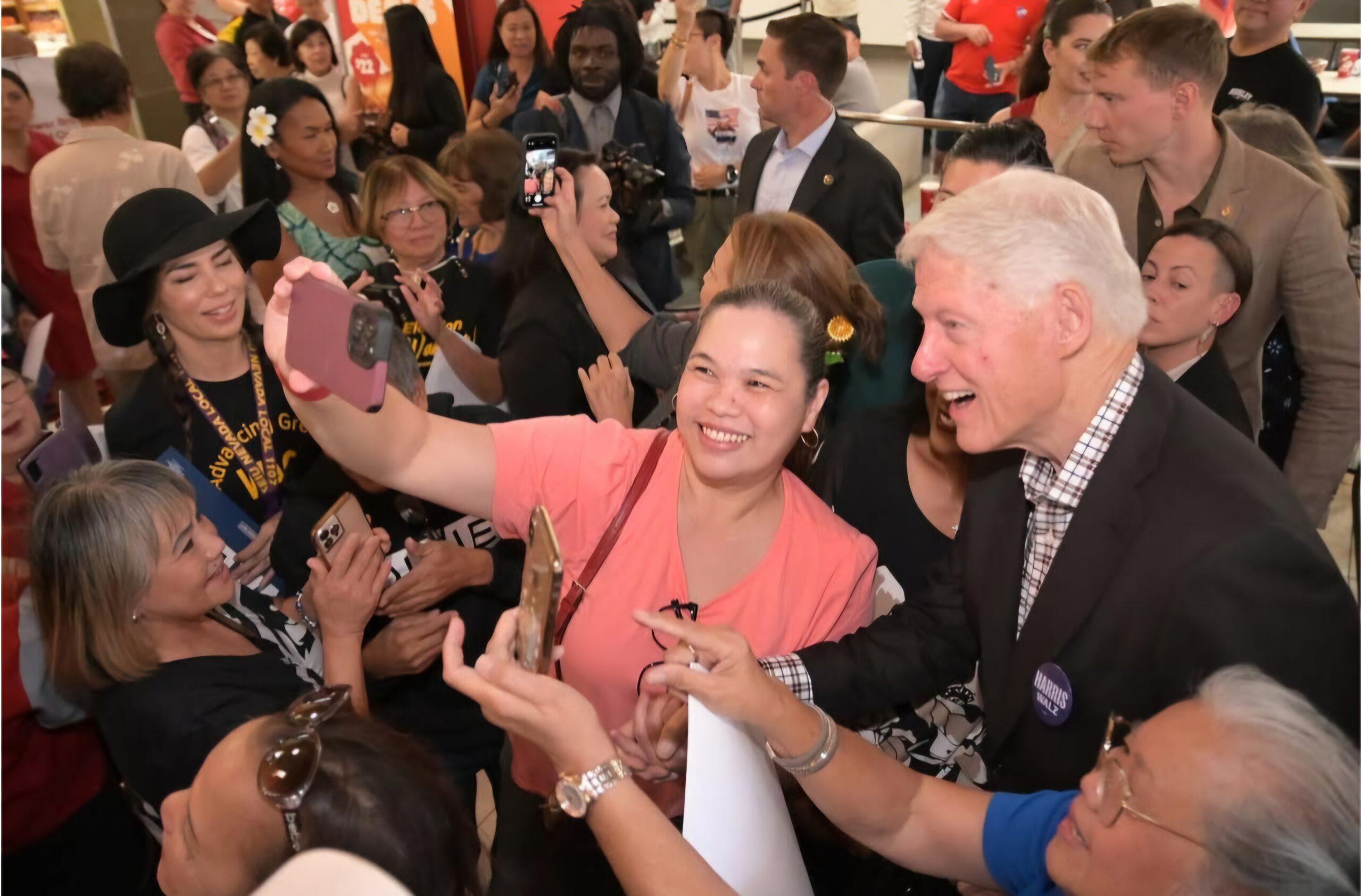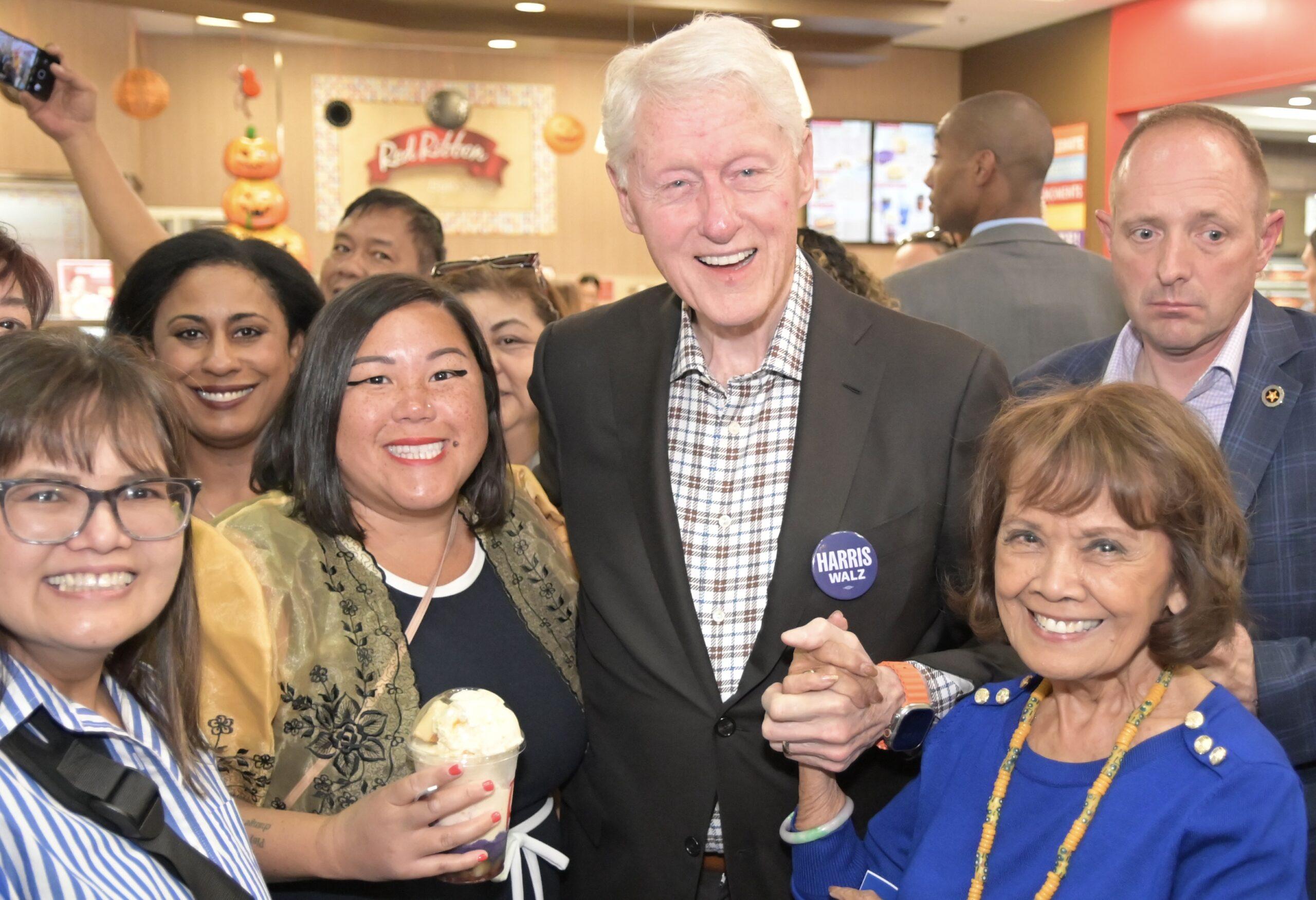Former U.S. President Bill Clinton with Nevada Assemblymembers Brittney Miller and Erica Mosca and community leader Rozita Lee during his visit to Las Vegas in October 2024. AJPress file photos by Robert Macabagdal
AS the 2024 presidential election enters the final leg, Filipino American voters in Nevada have become a focal point for both Republicans and Democrats, who recognize this community’s significant potential to influence outcomes in this crucial swing state.
The Asian American population in the Silver State represents nearly 12% of the electorate, and over 109,000 Filipino Americans are eligible voters, solidifying their importance in a state often decided by narrow margins.
A recent Washington Post article underscores this demographic’s growing influence, while recent surveys reveal a complex and evolving political stance within the community.
According to the Asian American Voter Survey released on Sept. 24 by research groups AAPI Data and Asian Pacific Islander American Vote (APIAVote), 68% of Filipino American voters said they would vote for Vice President Kamala Harris, the Democratic nominee, and 33% said they would vote for former Republican President Donald Trump.
Former President Donald Trump and the Republican Party have launched an active campaign to attract Filipino American voters in Nevada. At a recent rally in Las Vegas, Trump targeted the Asian American and Pacific Islander (AAPI) community with promises of economic growth, safety, and peace—priorities emphasized in messaging specifically crafted for Filipino American voters.
The Asian American Voter Survey also surveyed voters on Filipinos view the candidates in the context of certain policy and social issues.
Regarding immigration policy, Filipinos led the pack with 70% saying that they could not vote for a candidate who doesn’t share their views.
On racism and discrimination, 81% of Filipino voters said that it was important to them that a candidate agrees with their views—the highest among other groups.
About half of all Filipino voters (45%) said they’d prefer to vote for a candidate who shares their views on the Israel-Palestine war. More than half said that the economy (60%) and climate change (59%) were key issues to keep in mind when choosing a candidate.
Additionally, 61% said abortion was a key issue and 67% said crime and violence.
The survey also recorded participants’ worries over the electoral process overall. Filipinos were by far the most concerned group when it comes to voter fraud (44%), not having their vote count (44%), misinformation about voting location (41%) and being barred from voting (36%).
Moreover, Filipinos were also the most concerned AAPI group in terms of misinformation about the candidates (64%), violent aftermath of the election (57%), legal challenges to the election (51%), and the possibility of violence at the polls (47%).
Drew Johnson, a Republican running for Nevada’s 3rd Congressional District, has taken a proactive approach to outreach, attending Filipino community events and accepting an “honorary Filipino” title. His emphasis on economic reform and border security aligns with the values of certain Filipino voters, particularly those working in Nevada’s tourism and service industries.
Democrats have ramped up their efforts over the past few months. Vice President Kamala Harris, whose background and policies appeal to diverse communities, has targeted Filipino Americans through “Karaoke for Kamala” events, political ads in Tagalog and outreach in Filipino grocery stores, with a recent notable visit by former President Bill Clinton.

Surveys show Harris’s focus on health care resonates with Filipino Americans in Nevada, many of whom work in healthcare roles. Harris’s campaign also emphasizes Social Security and senior care—issues that matter greatly to Filipino American families caring for elderly relatives.
Nevada Representative Susie Lee, a Democrat, has also invested heavily in the Filipino community, highlighting worker-focused policies and organizing Filipino-centered events. However, some survey data suggests that certain Filipino American voters are reevaluating their support due to discontent with the handling of the economy and immigration under Democratic leadership.
Notably, a growing number of Filipino American voters identify as independent. Recent polling indicates that independent Filipino American voters prioritize economic stability and job security and may be open to aligning with candidates from either party based on these issues.
Nevada’s 3rd Congressional District, where about 20% of residents are Asian American, exemplifies the impact Filipino Americans could have in close races. Representative Susie Lee’s margin of victory has decreased each election cycle, from a 9% lead in 2018 to only 4% in 2022. With such slim margins, Filipino American voters may well decide the outcome in 2024.
The Filipino American electorate’s growing involvement underscores a larger trend of increasing Asian American political engagement nationwide. Data from recent elections shows a 14% increase in voter turnout among Asian Americans from 2016 to 2020, making them one of the fastest-growing groups of eligible voters. Filipino Americans in Nevada have an unprecedented opportunity to shape both state and national politics.






